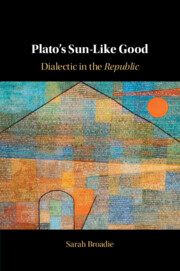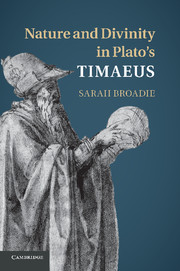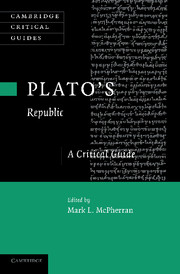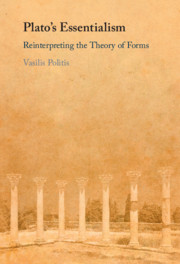Plato's Sun-Like Good
Dialectic in the Republic
$32.99 (F)
- Author: Sarah Broadie, University of St Andrews, Scotland
- Date Published: February 2023
- availability: Available
- format: Paperback
- isbn: 9781009016407
$
32.99
(F)
Paperback
Other available formats:
Hardback, eBook
Looking for an examination copy?
This title is not currently available for examination. However, if you are interested in the title for your course we can consider offering an examination copy. To register your interest please contact [email protected] providing details of the course you are teaching.
-
Plato's Sun-Like Good is a revolutionary discussion of the Republic's philosopher-rulers, their dialectic, and their relation to the form of the good. With detailed arguments Sarah Broadie explains how, if we think of the form of the good as 'interrogative', we can re-conceive those central reference-points of Platonism in down-to-earth terms without loss to our sense of Plato's philosophical greatness. The book's main aims are: first, to show how for Plato the form of the good is of practical value in a way that we can understand; secondly, to make sense of the connection he draws between dialectic and the form of the good; and thirdly, to make sense of the relationship between the form of the good and other forms while respecting the contours of the sun-good analogy and remaining faithful to the text of the Republic itself.
Read more- Offers a new interpretation of a core doctrine of Platonism
- Makes sense of one of the most famous and most enigmatic passages in the whole of Plato
- Provides clear and closely reasoned guidance through the central books of the Republic
Reviews & endorsements
‘Sarah Broadie’s new book is one of the most exciting and important books I have read on Plato’s Republic. Its rigorous and systematic challenge to orthodox ways of understanding what the form of good is, and why mathematics plays a central role in a philosopher’s education, will be debated for many years to come.’ Richard Kraut, Northwestern University
See more reviews‘… exemplary and inspiring.' William Altman, Bryn Mawr Classical Review
Customer reviews
Not yet reviewed
Be the first to review
Review was not posted due to profanity
×Product details
- Date Published: February 2023
- format: Paperback
- isbn: 9781009016407
- length: 250 pages
- dimensions: 229 x 152 x 13 mm
- weight: 0.37kg
- availability: Available
Table of Contents
Part 1. Approaching the Sun-Good Analogy:
1.1 Introductory
1.2 The philosopher-rulers' intellectual task
1.3 'The most important thing to learn': Between plural and singular
1.4 What further knowledge does the longer way achieve?
Part 2. The Form of the Good and Knowledge:
2.1 Sun, cave, and sun again
2.2 Connecting sun and line
2.3 Higher and lower intellectual levels
2.4 Mathematical versus dialectical hypotheses
2.5 Saphēneia
2.6 The form of the good as non-hypothetical principle
2.7 Dialectic and the good: Some questions
2.8 The role of the form of the good in dialectic
2.9 Some objections and replies
2.10 Textual counterevidence
2.11 The non-hypothetical principle as first premiss?
2.12 The form of the good as object of definition?
2.13 Dialectic and experience
2.14 Diagrams, dialectic, and context
2.15 Dialectic in government
2.16 Not rigorous enough?
2.17 Why is dialectic cognitively superior to mathematics?
2.18 Why are we shown so little about dialectic in the Republic?
2.19 True philosophers versus sight-lovers
2.20 Criteria and scope of 'good'
2.21 Main positions of Parts 1 and 2
Part 3. The Form of the Good and Being:
3.1 Preliminaries
3.2 First proposal
3.3 Interim discussion of 505a2-4
3.4 Second proposal
3.5 Perfectionist accounts
3.6 System accounts
Part 4. Various Further Questions:
4.1 Ambiguity of 'the good' (I)
4.2 Ambiguity of 'the good' (II)
4.3 Why the mathematical education?
4.4 Cosmology, theology
Part 5. Winding Up.
Sorry, this resource is locked
Please register or sign in to request access. If you are having problems accessing these resources please email [email protected]
Register Sign in» Proceed
You are now leaving the Cambridge University Press website. Your eBook purchase and download will be completed by our partner www.ebooks.com. Please see the permission section of the www.ebooks.com catalogue page for details of the print & copy limits on our eBooks.
Continue ×Are you sure you want to delete your account?
This cannot be undone.
Thank you for your feedback which will help us improve our service.
If you requested a response, we will make sure to get back to you shortly.
×




